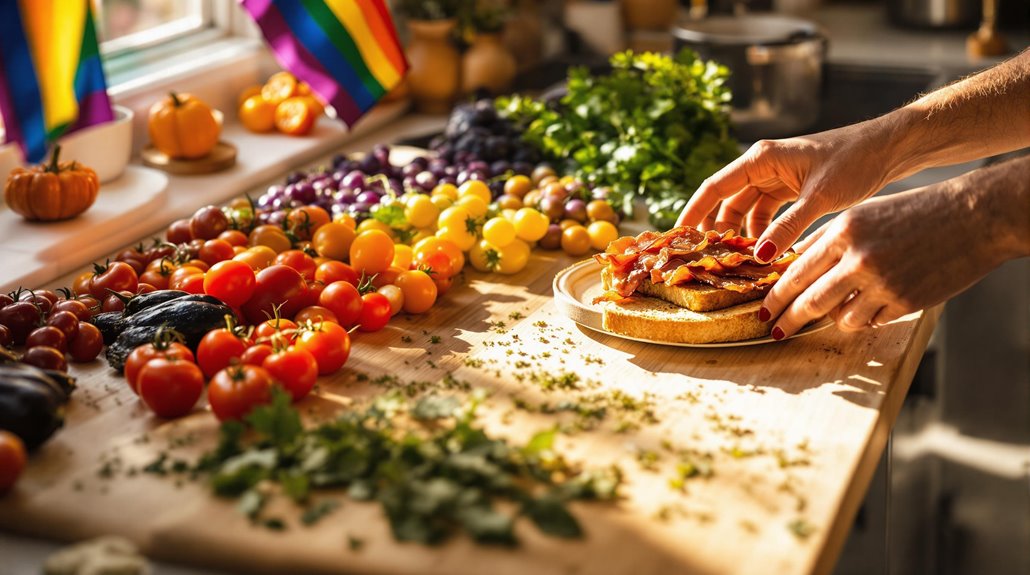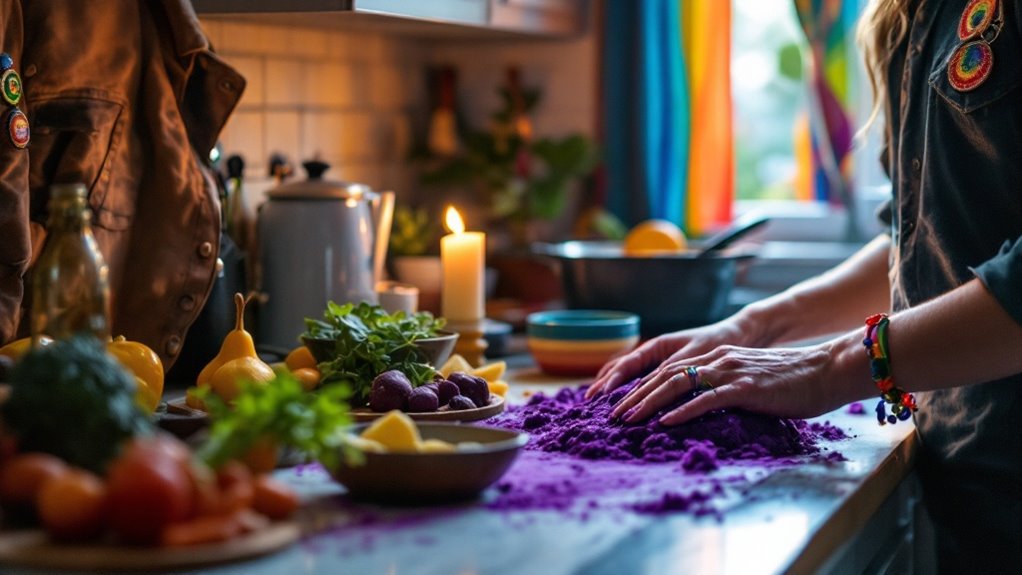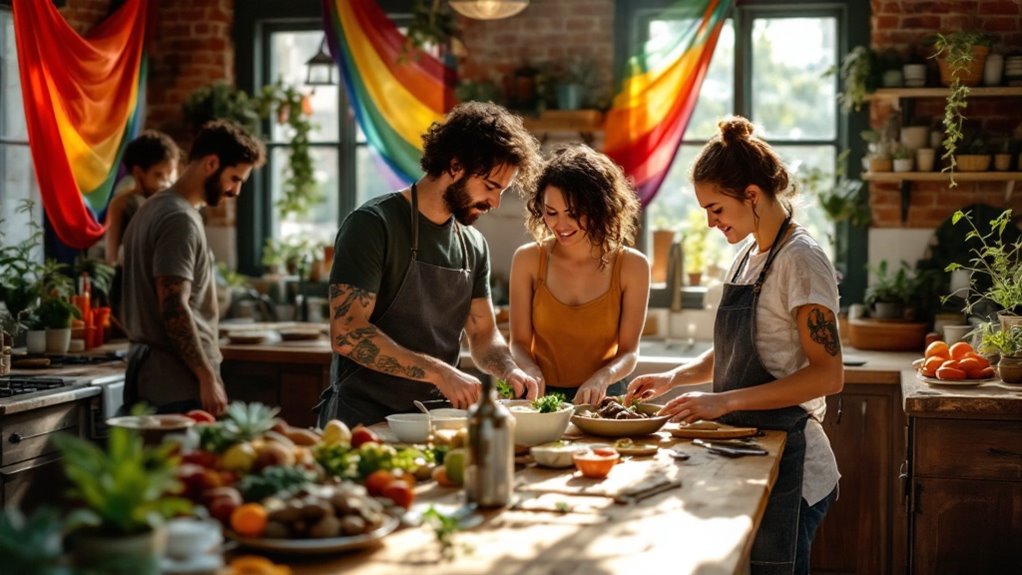Physical Address
304 North Cardinal St.
Dorchester Center, MA 02124
Physical Address
304 North Cardinal St.
Dorchester Center, MA 02124

The intersection of queer culture and veganism runs deeper than you might think. Both movements share a rich history of liberation activism since the 1960s, with over 66% of UK vegan community members identifying as LGBTQ+. You’ll find parallel journeys of self-discovery, challenging societal norms, and creating safe spaces through digital platforms and community gatherings. From decolonizing food narratives to building mutual aid networks, this powerful alliance continues to reshape how we think about identity, justice, and compassion.

While many people view the LGBTQ+ and vegan movements as separate paths, they’ve actually shared a rich history of activism and mutual support since the 1960s.
The watershed moment came with the 1969 Stonewall Riots, which didn’t just catalyze LGBTQ+ activism but inspired intersectional solidarity across various liberation struggles. Following this pivotal moment, activists embraced direct action tactics as a primary means of creating social change.
The Stonewall Riots ignited more than LGBTQ+ resistance – they sparked a unified wave of liberation movements fighting shared oppression.
The Gay Liberation Front emerged alongside groups like the French FHAR, connecting queer liberation with animal rights and anti-capitalist ideologies.
Their shared emphasis on bodily autonomy and resistance to dominant power structures created natural allies. Even their tactics overlapped – from adopting militant protest styles to using underground zine networks for spreading their messages.
Today, you’ll often see Pride events featuring vegan outreach and animal rights marches incorporating queer liberation themes.
The rise of digital platforms has revolutionized how queer and vegan movements connect, organize, and share knowledge. You’ll find vibrant communities across Instagram, TikTok, and Discord where intersectional activism thrives, with creators like @QueerBrownVegan reaching over 500,000 followers through accessible education about environmental justice.
Digital spaces have become powerful catalysts for change in three key ways:
Through these platforms, you’re not just consuming content – you’re participating in a global movement that’s reshaping how we think about identity, food justice, and environmental activism. These digital spaces provide a crucial platform for younger generations to challenge academic norms and advocate for intersectionality in environmental education.

Beyond adopting plant-based eating habits, queer veganism represents a complex journey of identity formation that’s deeply intertwined with personal healing and community building.
You’ll find that this lifestyle often emerges as a powerful coping mechanism, helping many navigate past trauma while reclaiming agency over their bodies and consumption choices. The study shows that online support networks play a crucial role in maintaining and strengthening these identities. In shared spaces, you’re part of a movement that challenges both heteronormative expectations and traditional food cultures.
Through collective meal preparation, protest actions, and mutual aid networks, you’ll discover how queer vegan communities create supportive environments that validate both identities.
Queer vegan spaces nurture both personal identity and collective action through shared meals, activism, and community support.
These spaces aren’t just about what’s on your plate – they’re vibrant hubs where you can explore the intersection of animal rights activism and LGBTQ+ advocacy, all while building meaningful connections with others who share your values.
When you look beyond mainstream vegan narratives, you’ll find rich traditions of plant-based living rooted in Indigenous wisdom and practices that challenge white-centric approaches to ethical eating.
Your journey to understand decolonial veganism starts with recognizing how colonial systems have disrupted traditional relationships with food, land, and animals while simultaneously erasing cultural food practices.
Modern vegan movements often reflect a troubling legacy of white supremacist roots dating back to post-abolition animal rights activism that targeted marginalized communities.
Modern vegan movements often perpetuate colonial mindsets while ignoring Indigenous wisdom and food sovereignty.
You’ll find that many Indigenous communities have maintained sustainable relationships with animals for generations, viewing them as relational kin rather than commodities.
Unfortunately, mainstream veganism frequently dismisses these traditional practices while appropriating Indigenous symbolism for their campaigns. The political activism rate among queer individuals often leads to stronger engagement with food justice movements.
Here’s what you should know about Indigenous perspectives on food systems:
When you’re exploring vegan ethics, it’s essential to recognize how colonial histories have shaped current food systems and acknowledge Indigenous wisdom that’s been historically suppressed.
Transforming vegan narratives requires moving past superficial consumer choices to address deeper systems of colonial oppression.
You’ll find that mainstream “cruelty-free” marketing often masks exploitative supply chains that harm Global South communities, while white-centric vegan rhetoric can weaponize compassion to erase Indigenous practices.
Instead of falling for corporate greenwashing, you can support grassroots movements like Veggie Mijas, which centers BIPOC voices through plant-based workshops in food apartheid zones. Taiwan demonstrates how Buddhist influences naturally foster plant-based eating without colonial impositions.
You’ll discover that true decolonial veganism prioritizes land rematriation and Indigenous food sovereignty over trendy plant-based aesthetics.
While mainstream veganism often centers white, Eurocentric narratives, the rich history of plant-based eating extends far beyond Western cultures.
You’ll find that over 70% of pre-colonial Indigenous communities thrived on sustainable plant-centric food systems, while many African and Asian cultures have practiced plant-based traditions for millennia. The devastating effects of Western food marketing have historically undermined these traditional plant-based cuisines across colonized regions.
Today, marginalized communities are reclaiming their ancestral food practices through:
You’re witnessing a powerful movement as BIPOC and LGBTQIA+ activists challenge the Eurocentric framing of veganism, reconnecting with their cultural heritage while advancing food sovereignty for all.
Coming out as queer and vegan often involves parallel journeys of self-discovery, as you navigate social pressures while embracing your authentic identity in both spheres.
You’ll find that digital platforms have become powerful tools for amplifying these intersectional experiences, with hashtags like #QueerBrownVegan creating visibility for voices that were historically silenced.
Through online and offline community-building, you’re helping create safe spaces where both identities can flourish together, challenging traditional narratives and fostering understanding across different social movements. Many women and non-binary individuals find that adopting a plant-based lifestyle helps them reclaim their agency in a world that often seeks to control their choices.
Through parallel journeys of self-discovery and social exploration, queer vegans often find themselves undertaking two profound processes of “coming out” – one involving their sexuality or gender identity, and another centered on their ethical dietary choices.
You’ll find remarkable similarities between these disclosure experiences, as both challenge societal norms and require immense personal courage.
While you can sometimes choose when to reveal your veganism, queerness may be more visible through gender expression, creating unique challenges in maneuvering different spaces. Research shows that while queerness represents an inherent identity trait, veganism remains a conscious lifestyle choice.
The overlap is particularly striking in UK vegan communities, where over 66% of Facebook group members identify as LGBTQ+, highlighting how these parallel journeys often intersect.
Digital activism has revolutionized how queer vegans amplify their intersectional message, creating powerful ripple effects across social media platforms.
You’ll find vibrant communities forming through hashtags like #QueerVegan, where engagement soars 38% higher than single-topic posts. On platforms like Instagram and TikTok, accounts such as @QueerBrownVegan break down complex ideas into digestible content, making advocacy accessible to everyone.
When you explore these digital spaces, you’ll discover how virtual speak-outs and crowdsourced projects are bypassing traditional gatekeepers. These platforms create safe and inclusive environments for activists from all backgrounds to share their perspectives.
Livestreamed panels featuring diverse voices, especially Black trans vegans, generate four times more shares than conventional presentations. Through these platforms, you’re witnessing a new era where grassroots organizing and data-driven advocacy merge to create unstoppable momentum for both movements.
While online activism opens doors for advocacy, real-world connections create powerful anchors for the queer vegan community. You’ll find welcoming spaces at vegan-friendly restaurants, cafés, and bars where LGBTQIA+ individuals gather to share meals and discuss activism. Events like Spicy Moon gatherings demonstrate the growing popularity of these inclusive dining experiences.
These inclusive environments help combat isolation while fostering meaningful connections through shared experiences and values.
When you’re creating safe spaces, it’s crucial to address accessibility needs, from wheelchair access to financial barriers, while actively dismantling power dynamics related to race, class, and age.
Your commitment to inclusivity guarantees everyone feels truly welcome.
As queer veganism challenges traditional hierarchies, it offers a radical reimagining of kinship that extends far beyond human-to-human relationships.
You’ll find that this perspective breaks down the rigid boundaries between species, recognizing that care and connection aren’t limited by biological ties or traditional family structures.
When you explore queer vegan communities, you’ll discover how they’re creating new forms of solidarity through shared meals and mutual aid networks.
These practices aren’t just about food choices – they’re actively resisting systems that have historically marginalized both LGBTQ+ individuals and nonhuman animals.
Queer veganism dismantles oppressive hierarchies by recognizing shared struggles and building solidarity across species boundaries.
Through meal-sharing rituals and communal cooking, they’re building chosen families that celebrate the interconnectedness of all living beings, while challenging the conventional notion that humans should dominate nature.
You’re witnessing a powerful convergence of movements that’s reshaping how we think about justice and compassion. Research shows that LGBTQ+ individuals are three times more likely to identify as vegan compared to the general population, reflecting deeper connections between these communities. As you explore these intersecting spaces of liberation, remember that your choices in food, activism, and community-building can create ripples of positive change across multiple spheres of justice.